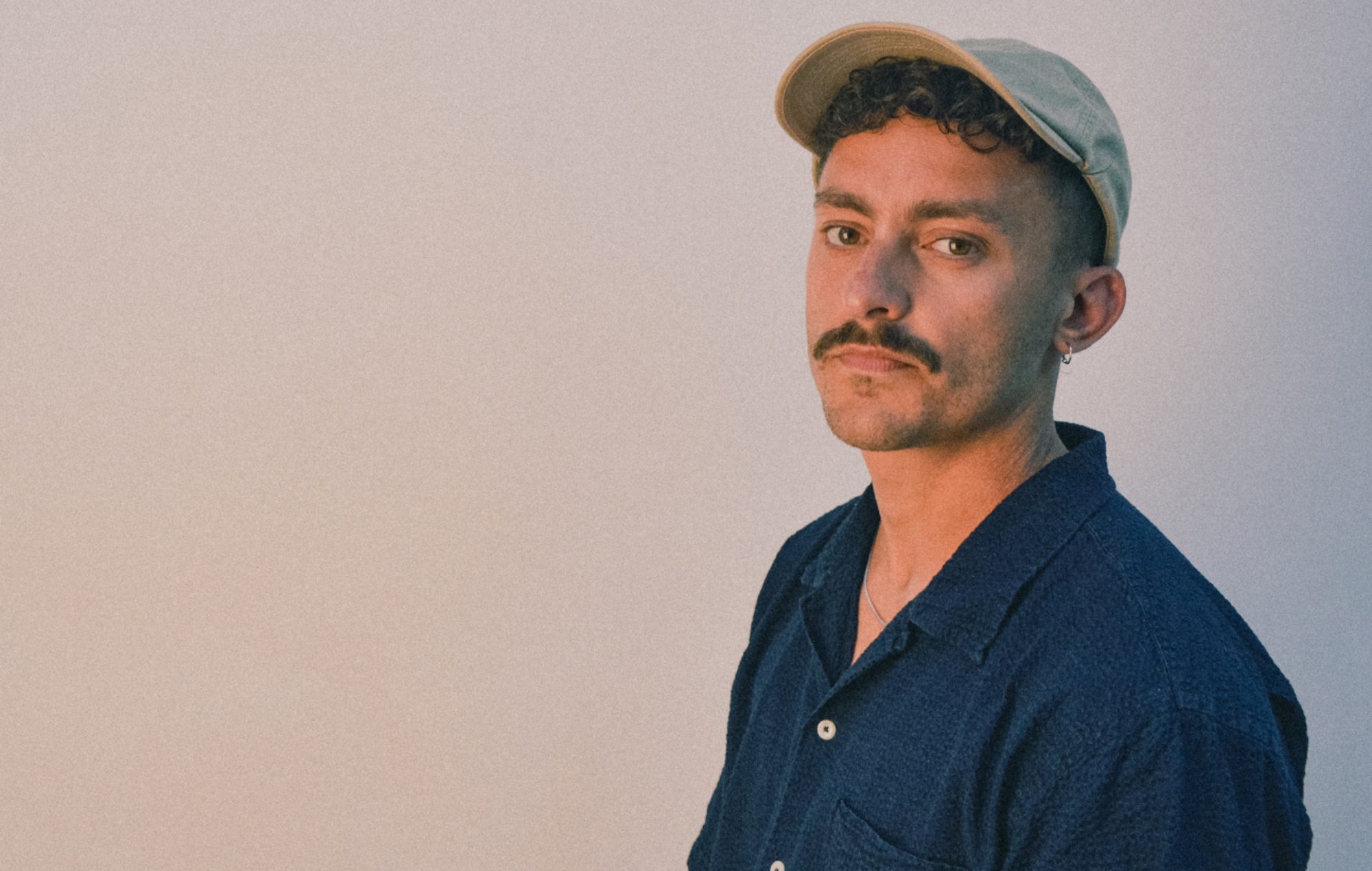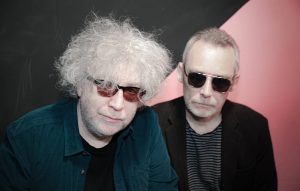If you’ve watched an episode of Jools Holland, listened to BBC Radio 6 Music or been to Glastonbury this year, you’ll have likely heard spoken-word artist Antony Szmierek. This summer, his breakout hit ‘The Words To Auld Lang Syne’ became an optimistic anthem for getting through dark times. “Tomorrow’s never promised / But neither was today / And when you need a friend, I’ll be there,” he repeats throughout the chorus, as though he’s directly reaching out to the listener. The track quickly caught the attention of new music fans, who compared his Szmierek’s direct, impactful delivery to The Streets’ Mike Skinner.
Throughout his recent UK headline tour, the Mancunian’s social media channels were plastered with footage of elated audiences at his shows, where he would dance atop bar counters while delivering material from his recently-released ‘Seasoning’ EP. The collection exudes a kind of optimism that feels contagious when performed live: tales of love, hope and ambition told paired with lightly psychedelic guitar riffs and UK garage kick patterns.
These major achievements haven’t changed Szmierek, though. He’s still teaching children with learning difficulties in Greater Manchester while also balancing his duties as a fast-rising artist – all while maintaining a sincere gratitude that makes him so damn likeable. “This is all fucking great, I’m just so lucky,” he says to NME, sitting crossed-legged on a sofa, Diet Coke in hand, in the basement of new central London venue The Lower Third. “Honestly, I can’t believe I get to do this. It’s our first night of the tour, and for the first time, we’re seeing a crowd that’s come here for us.”
In the coming months, Szmierek will return to the capital for a sold-out date at the 600-capacity Lafayette in April, before playing his biggest show yet at New Century Hall in his hometown later that month. The excitement that the 32-year-old feels towards his current trajectory can be felt in conversation with NME; as he talks to us, he gives long, thoughtful answers, often going off on a tangent as he retells stories from his joyride of a year.
Here, Szmierek takes us through his desire to work with Jarvis Cocker, who he references on ‘The Words to Auld Lang Syne’ with the line: “And I never knew that you’d get married / And still I’d be living down here on my own / Disco 2023.” He also discusses taking inspiration from Alex Turner and how he’s creating a catalogue of heartfelt ‘pop poetry’.
NME: Why do you think ‘The Words To Auld Lang Syne’ has resonated so deeply with listeners?
“I guess the idea is that it’s ambiguous enough that everyone can fit their own meaning and narrative into it, like leading a horse to water. You get them halfway there and they fill in the other half with their exes, big nights out or whatever. We purposely made the instrumentals of that song sound super nostalgic and warm because the words are sad.
“I was trying to make a song that sounded like New Year’s Eve without mentioning it. It’s always a bit of a struggle, a lot of pressure. [NYE] can feel like, ‘You’re with your loved ones. And everyone’s achieving things, and you feel like people are leaving each other behind. Maybe you’ve not seen someone for a year. And there’s just a lot of conflict.’”
There’s a good Pulp reference in there too…
“Yeah, it took people a while to come around to that. We’re trying to get Jarvis on a song. I’ve got a tune written called ‘Yoga Teacher’ and when I wrote it, I thought he’d sound really good on it. It’s so low and almost like ‘House Music All Night Long’ by Jarvis. So, I really still want to do it. And I don’t want to put that song out until we get him on it. Even if it’s album three.”
Which other artists have influenced your songwriting?
“Well, there’s the one that everyone has been saying for a while, Mike Skinner. And I guess ‘The Words to Auld Lang Syne’ is kind of Streets-y, but if you look at everything, we’re not massively similar. My favourite band is Arctic Monkeys. I started writing stories and poems when I was like 18, because of Alex Turner. There are a lot of artists I like at the minute who are in the same realm, like Hak Baker, Sinead O’Brien and Yard Act.
“Then in terms of being on stage, I feel like [my performance is] like half Jarvis Cocker and half Alex Turner – I think my music distracts everyone from it because they have The Streets in their head. If you watch our performance you can see that we’re a band. We don’t use CDJs.”
Credit: Zac Watson
Are there lyrics of yours that you feel particularly proud of?
“I like the ambiguous ones, I like ‘Aren’t we all just smashed atoms and poached egg on toast? If you think about it?’, I think that’s the mission statement: everything’s meaningless if you let it be. You’ve got to try and find the joy in the moment. It’s quite a cliche, but that’s what I’m trying to put into the tunes.
“I think it’s inauthentic to try and write a ‘sad boy anthem’ at the moment. I still have tough days, and there are songs such as ‘Rock And A Calm Place’ that are about mental health, like The Cure when they do super sad lyrics over really ‘jumpy’ songs.
The words feel different every time I perform. When I was at Leeds festival, loads of my old students came who I’d not seen for years and years. One of them had a sign. And there’s the line in ‘The Words To Auld Lang Syne’ where I say, ‘I promise I’ll always be there when you need me the most.’ I accidentally looked over at him, choked up, and just ended up missing a whole verse because of it.”
How does your experience of being a teacher impact your live performances?
“It’s funny how similar it is. I don’t think I’d be as good without being a teacher. It’s the same as in a lesson, you pick out the person you feel needs it the most. I remember playing a show once and there was this girl who seemed shy in her body language, but she knew all the words to all the songs. The show was for her from then on.
“You’ll get rowdy people, the high-achievers. There’s the people at the back talking and you’ve got to try to get their attention. Especially at festival shows, because they can just leave if they want to.”
“It’s a fucking amazing feeling when everyone’s on the same page at a gig”
What made you want to pursue music?
“I would do poetry and spoken word in the week while I was teaching, and that was a lot harder because it was a capella and you feel like you have to make people laugh. If you do that, you’re killing it. But then you realise what you’re looking for is that silence and holding people’s attention.
“There’s a big poetry scene in Manchester, and I realised that I was better at the performing side of it. Then immediately I was like, ‘Let’s put some music to it.’ And it worked. We put guitars in that sounded like Foals, and it’s funny because no one would ever compare us to Radiohead but they’re one of our favourite bands, so we put a lot of their sound in there.”
“I realised what I wanted was feedback. I’ve written two novels, and I like to imagine people reading my books, but it’s a fucking amazing feeling when everyone’s on the same page at a gig. That transcendent bit when everyone’s got their arms up and their eyes closed… and I’m conducting it. It’s incredible.”
Credit: Zac Watson
As you continue to build and maintain momentum as a musician, do you plan to carry on teaching?
“I think I’ll have to stop after Christmas. It’s been difficult to juggle, but I love it. It’s a miracle I’ve done this. We got on the radio without pluggers, which just doesn’t happen, and we know everyone just wants us to do well.
“I’ve still done an impossible thing and I’d be happy to be a teacher. The fear of failure isn’t there. I’m just enjoying every single moment.”
Antony Szmierek’s ‘Seasoning’ EP is out now
The post Antony Szmierek: Mancunian’s joyful ‘pop poetry’ cuts through the noise appeared first on NME.




